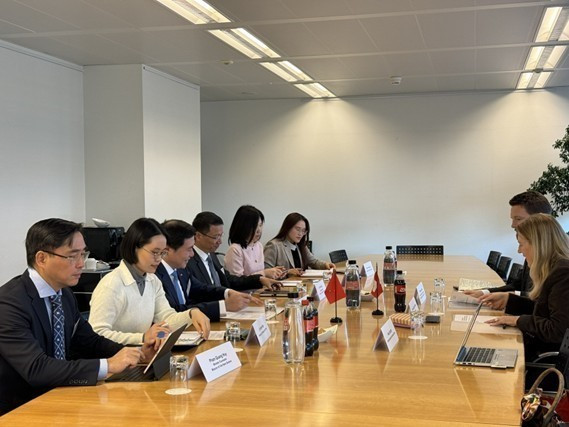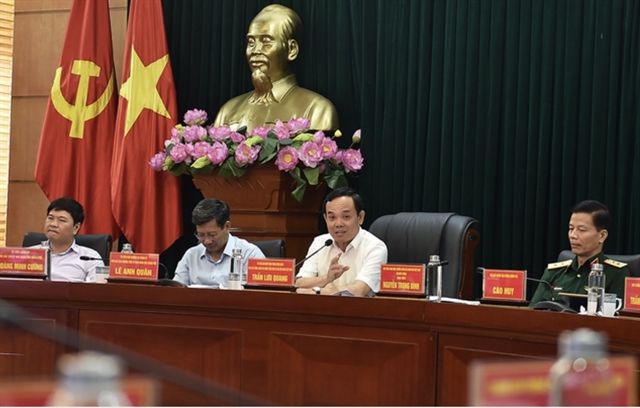 Economy
Economy


|
| Deputy Prime Minister Trần Lưu Quang (2nd right) in the meeting with authorities of Hải Phòng City, and Quảng Ninh and Hải Dương provinces in Hải Phòng City yesterday. Photo baochinhphu.vn |
HẢI PHÒNG CITY – Deputy Prime Minister Trần Lưu Quang yesterday worked with authorities of Hải Phòng City, and Quảng Ninh and Hải Dương provinces in Hải Phòng City.
The Deputy PM reviewed the production and business situation, disbursement of public investment capital, infrastructure construction, import and export, prevention and combat of smuggling, trade fraud, counterfeit goods and crime prevention.
According to reports, all three localities maintained a fairly high growth rate in the first nine months of this year, of which Quảng Ninh Province achieved the highest growth rate of 9.94 per cent, expected to reach over 11 per cent for the whole year while Hải Dương Province gained a growth rate of over 7 per cent.
The fields of industrial production, foreign investment attraction and tourism also achieved many positive results, in which Quảng Ninh and Hải Phòng are expected to attract FDI exceeding the set target, while total revenue from tourism in Quảng Ninh is forecast to exceed the level before the COVID-19 pandemic.
The fight against smuggling, trade fraud and counterfeit goods has gained many positive results thanks to close coordination between functional forces and investment in modern equipment to screen import-export goods at border gates.
Regarding import and export, Hải Dương Province recorded a total decrease of 14.2 per cent in turnover due to general difficulties in the world economy, but Quảng Ninh reached a growth of 14.15 per cent over the same period last year.
In terms of public investment disbursement, Quảng Ninh and Hải Phòng have carried out 82 per cent and 52 per cent, respectively, while Hải Dương reached only 38 per cent.
In the meeting, the local authorities proposed to the Central Government to remove difficulties and obstacles related to land use norms, land auctions, sea reclamation, medical equipment procurement, and building a database on administrative sanctions, social housing development, investment in urgent projects to provide electricity for new projects, and expansion of Hải Phòng’s Cát Bi Airport.
Speaking at the meeting, Deputy PM Quang highly appreciated the dynamism and creativity of all three localities in their efforts to recover and develop the economy after the pandemic, thereby achieving growth among the top in the country.
He especially praised the great attention to improving connectivity between the three localities to promote mutual development, especially in transport infrastructure as well as contributions of resources to the overall development of the country.
“During the most difficult times, the Government clearly identified that promoting public investment was one of the most important solutions to both remove bottlenecks in local infrastructure and speed up socio-economic recovery and development. Therefore, the localities must focus highly on this task,” Quang told the meeting.
“In the context of complicated world developments, Việt Nam still maintained a good international position and political stability, and was striving to adjust policies to attract more favourable investment,” the Deputy PM said.
“The localities must prepare well to meet investors' requirements,” he said.
He requested Hải Phòng and Hải Dương to focus on completing the construction of provincial planning on schedule, ensuring quality so that after promulgation, it is not binding or obstructing implementation of investment projects.
Regarding policy adjustment, Quang requested ministries, branches and localities to share responsibility to remove institutional bottlenecks according to the principle of maximum decentralisation for localities.
The localities were also asked to further enhance digital transformation and linkages between localities, promote the coordinating role of the leaders in resolving difficulties and obstacles of investment projects, and pay special attention to fire and explosion prevention and fighting. VNS